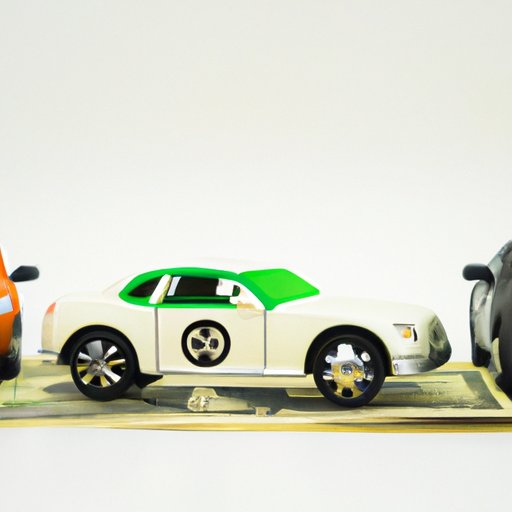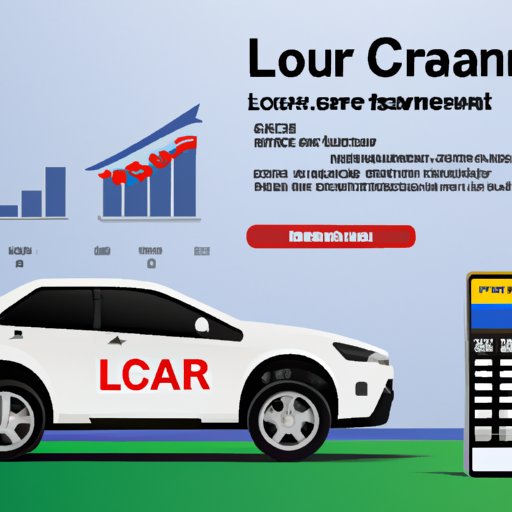Introduction
Buying a car is an exciting experience, but it can also be intimidating if you don’t know how much car loan you can qualify for. Knowing your maximum loan amount will help you set realistic expectations and determine which type of car you can afford. In this article, we’ll cover the basics of car loan qualification, including how to calculate your maximum loan amount, what factors impact car loan qualification, and strategies for finding the best loan interest rate.
Calculating Your Maximum Car Loan Amount
The first step in determining how much car loan you can qualify for is calculating your debt-to-income ratio. This is a key factor in qualifying for any type of loan, as it shows lenders how much of your income is already being used to pay off debts. To calculate your ratio, divide your total monthly debt payments (including your estimated car loan payment) by your gross monthly income.
Once you have your debt-to-income ratio, you’ll need to estimate your monthly payment. This includes principal, interest, taxes, and insurance (if applicable). You can use an online loan calculator to get an estimate of your monthly payment based on the loan amount, interest rate, and loan term.
Finally, you’ll need to determine how much you can borrow. Generally speaking, lenders prefer that your total monthly debt payments are no more than 36% of your gross monthly income. Based on your estimated monthly payment and debt-to-income ratio, you can calculate how much you can borrow. Keep in mind that this amount is your maximum loan amount, so you may want to borrow less depending on your financial situation.
What Factors Impact Car Loan Qualification?
When applying for a car loan, there are several factors that lenders take into consideration. The most important factor is your credit score. Lenders use your credit score to evaluate your creditworthiness and determine whether or not they’re willing to lend to you. Generally speaking, the higher your credit score, the better your chances of qualifying for a loan with a lower interest rate.
Lenders also consider your employment history, including your current job and past jobs. If you’ve been employed at the same company for a long time, it shows lenders that you’re reliable and financially responsible. Additionally, lenders may require a down payment, especially if you have a low credit score or limited employment history.
Finally, lenders may consider a co-signer for your loan if you don’t meet their requirements. A co-signer is someone who agrees to take responsibility for the loan if you default. This can be helpful if you don’t have a good credit score or enough income to qualify for the loan on your own.
How to Estimate Your Car Loan Qualification
If you’re not sure how much car loan you can qualify for, there are a few ways to estimate your maximum loan amount. The easiest way is to use an online loan calculator. This will give you an estimate of your monthly payment and maximum loan amount based on the information you provide. Keep in mind that this is just an estimate, and the actual loan amount may be different.
Another option is to contact a bank or lender directly. They can provide you with more accurate information and help you determine which loan product is right for you. Keep in mind that each lender has different requirements, so it’s important to shop around and compare offers from multiple lenders.

Tips for Qualifying for a Larger Car Loan
If you want to qualify for a larger car loan, there are some steps you can take to improve your chances. The first is to improve your credit score. Paying down your debt, disputing inaccuracies on your report, and making all of your payments on time can all help improve your score. You should also consider making a larger down payment, as this can reduce the amount you need to borrow and make you more attractive to lenders.
Finally, you may want to consider getting a co-signer. This can help you qualify for a larger loan amount since the co-signer’s credit score and income will be taken into consideration when determining your eligibility.
What are the Pros and Cons of Taking Out a Car Loan?
Taking out a car loan can be a great way to buy a car, but it’s important to understand the pros and cons before making a decision. On the plus side, taking out a loan allows you to purchase a car without having to pay the full cost upfront. It also allows you to build your credit by making regular payments on time. On the downside, taking out a loan means you’ll have to pay interest, which can add up over time.

Understanding Interest Rates and Other Fees Associated with Car Loans
When shopping for a car loan, it’s important to understand interest rates and other fees associated with the loan. Most car loans have fixed interest rates, meaning the rate won’t change for the life of the loan. However, some lenders may offer variable interest rates, which can fluctuate depending on market conditions. It’s also important to be aware of any additional fees, such as application fees, origination fees, or late payment fees.

Strategies for Finding the Best Car Loan Interest Rate
Finding the best car loan interest rate is key to getting the most out of your loan. The best way to do this is to shop around and compare offers from multiple lenders. You can also use an online loan marketplace to compare offers from various lenders in one place. Finally, don’t be afraid to negotiate with lenders. Many are willing to work with you to get the best rate possible.
Conclusion
Knowing how much car loan you can qualify for is a crucial step in the car buying process. By calculating your debt-to-income ratio, estimating your monthly payment, and determining your maximum loan amount, you can determine which type of car you can afford. Additionally, there are several steps you can take to increase your chances of qualifying for a larger loan, such as improving your credit score and making a larger down payment. Finally, it’s important to shop around and compare offers from multiple lenders to find the best loan interest rate.
(Note: Is this article not meeting your expectations? Do you have knowledge or insights to share? Unlock new opportunities and expand your reach by joining our authors team. Click Registration to join us and share your expertise with our readers.)
